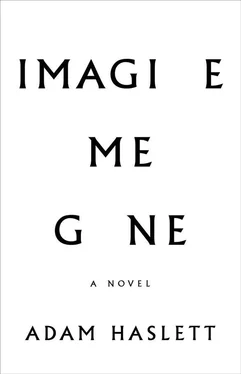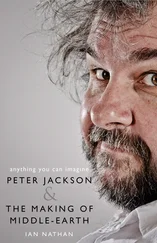All three of my children have jobs and more or less pay for their own things. Still, I don’t know how much of our situation they understand: that there is only debt. Their mother would never tell them, but she yells it at me at night. And though Celia has given up, Alec sometimes knocks on the living room door and pleads with us to stop fighting, and then the liquid in my skull becomes so heavy I can barely keep my eyes open, wanting so much for it all to go away — the tight air, the words contracting like muscle over bone. Alec pushes the woman’s grocery cart to her Volvo, but it’s only as he’s skating it back across the parking lot that he sees me off to the side and comes to a halt.
Business being slow, they don’t mind him taking his lunch break early. We walk down toward the town hall. I have no destination in mind and he doesn’t ask for one. It’s ordinary for us not to talk when we’re alone together, which isn’t often. He’s become prehensile, stretched up on spindly legs. He could probably bathe more than he does. He’s in that larval stage, the damp, pained shedding of the child’s body. This is what boarding school is for. To store them away during years like this, so they can suffer without the embarrassment of their parents watching. And much good that did you, Margaret would say. He’s fiddling with his fat little Swiss Army knife, picking out each blade and tool, folding them back down again, then fanning them out at different angles.
“I’m hungry,” he says.
We keep going past the Catholic church and the police station and the semi-detached white town houses set back from the road. There are free tables visible through the window of the diner; at least it will be cool inside. I spent a lot of time here last fall with a legal pad drafting letters to investors for what I thought might become a new investment fund. Tradesmen and retirees are the people who frequent the place. Not the young mothers or men on business meetings. The food’s too greasy and the inside not clean enough. The owner, a Latvian fellow who sat with me one afternoon and spoke for two hours about his life in the Soviet navy, waves from the kitchen. The smells from the fryers are unusually heavy. They fill my head and lungs, leaving me slightly nauseous. I notice the dandruff on Alec’s shoulders as he hunches over the laminated menu. He is asking me if I heard his question. The waiter is standing by our table. No, I tell him, what’s your question?
“Is it okay if I get the chili and a Monte Cristo sandwich?”
Afterwards he will want chocolate cake. In restaurants his mother tries to save small sums of money by ordering the cheapest thing on the menu. Which I’ve always considered defeatist.
“What are you getting, Dad?”
“Nothing,” I say, “I’m fine.”
The beast isn’t in Alec. I have no way of knowing this for certain. He’s too young. Maybe I just don’t see it and don’t want to. But in his eagerness to please there is such squirming energy and a kind of literalness. He’s up on the surface of himself opening outward, even when he’s embarrassed, perhaps particularly so then, because he finds embarrassment so painful he’ll do anything to get off the spot. He’s a bit of an exhibitionist, too. As a toddler he used to walk naked into our bedroom and stand there, biting his lower lip and smiling. There’s a photograph of him at my brother-in-law’s house at Christmastime when he’s four or five standing at the top of the back stairs with his trousers down asking for help in the bathroom. Who the drunk was that took the picture before helping him, I forget. Never such things with Celia, and certainly never with Michael. Being the youngest, that is part of it. He understood the rules from the point of view of someone who got to break them. They were provisional, and with wile, they could be set aside. And then eventually I would have to give him a spanking and he would weep. But his sullenness never lasted. He was too impatient. And still is. Impatient to be older. He eats his sandwich with his mouth open.
“Are we going to go back to Maine ever?” he asks. “Like, this summer?”
“I don’t know,” I say, and I can tell from the way he stops chewing for an instant and glances at me that he suspects there is something wrong with me again, though what that means to him I have no idea. I am, after all, out of bed and here with him now. And I am all he has ever known. I heard him once through the door of his room boasting to a school friend that his father had his own company and made all the decisions himself and traveled all over the world. My strange American son, who doesn’t close his mouth when he eats, but is otherwise so well mannered.
“Celia earns more money than I do,” he says. “And she just makes salads at the restaurant. But she gets better tips. So I think maybe I should ask for a raise. I saw the assistant dairy manager’s paycheck and he makes eight forty-five an hour, I get six twenty-five, but I still work the dairy case when he’s not there. Don’t you think I should ask for a raise?”
“You should visit your grandmother in England,” I say. “She’s mentioned that to you, hasn’t she? You coming there to stay with her sometime?”
“There’s nothing to do at her house.”
One day he’ll go. She won’t tell him the story of her own father, or the one time I met him — by accident, in a shop in Southampton — because for her it wouldn’t be proper to discuss such unfortunate things. Which makes me think that I should tell him.
My mother never mentioned my grandfather because he’d divorced my grandmother, which was unheard-of then, and taken his sons with him. He’d gotten rich several times and always wound up broke, though how I’m not sure. The day I met him would have been sometime in 1946 or ’47. My mother and I were in a queue at the bakery, waiting for bread rations. She gripped my arm and I looked up to see her staring in guarded terror at a man with a gray-brown mustache, dressed in an expensively tailored suit and bowler hat, who had stopped beside her.
“Hello, Bridget,” he said. “You look well. And who is this?”
For a moment, she said nothing. I thought the man had offended her by being familiar. But then, in an oddly low tone, very unlike her usual voice, she said, “This is John. John, shake your grandfather’s hand.”
It was the first time she’d seen him in twenty years. He waited with us in the line and then came back to the house for tea. He told us he was living in London, and that he had come down to Southampton for the day on business. I remember how he sat with his legs crossed in the wingback chair by the fireplace, with his gold cuff links and polished brogues, his body very much at ease, as if he’d run into an old friend and was visiting a house he knew well. Each time he took a biscuit from the plate he gave me a little smiling nod. After half an hour of pleasantries and intermittent silence he checked his watch and said he had a train to catch. On the doorstep, he kissed my mother on the cheek and tipped his hat to me. “Very glad to meet you, John,” he said, and then he was gone.
Given that he was a stranger, his sudden brief appearance didn’t much matter to me. But the sight of my mother perched on the edge of the sofa as the two of them spoke — her jaw tightened, her eyes wide and unblinking, her body rigid as a post — quickly and quietly destroyed the illusion of her perpetual sameness, of her having always been my mother and nothing else. She suffered for alien reasons, caught up in times I could never reach. I’d understood that people put on various manners: the soldier’s perpetual joking; my teachers’ punitive zeal; even my father’s brusqueness, which suggested everything was an interruption, could seem an act. But my mother had always been actual life, not prejudice or adaptation. She was the way of knowing anything to begin with. Until that afternoon. Air raids hadn’t frightened her. She would shoo my brother and me into the reinforced room, get the little bag of food from the cupboard, and tell us to sit under the dining room table while she and my father sat in chairs nearby, only occasionally whispering to each other. Her voice didn’t change then. It simply became more efficient. But here was an elderly gentleman having tea on a Saturday morning in our sitting room who could make her very speech and body foreign to me.
Читать дальше












